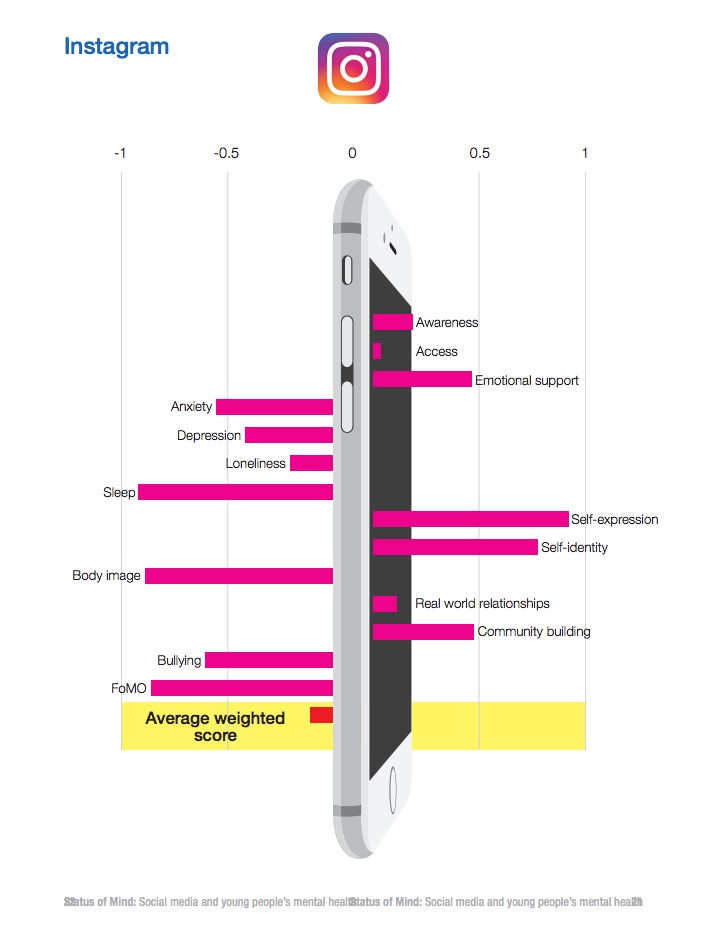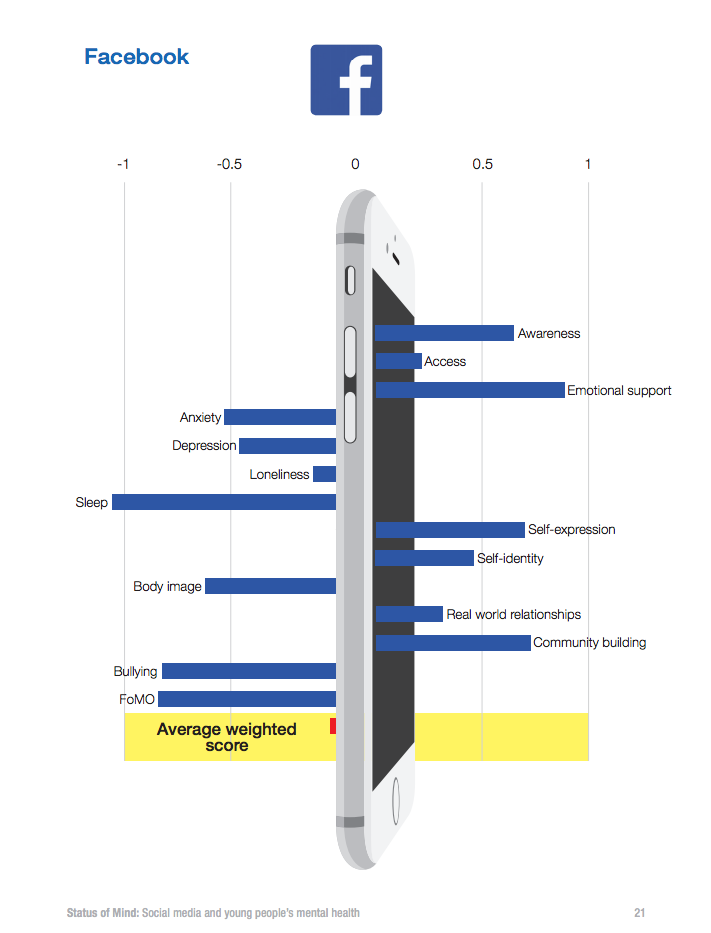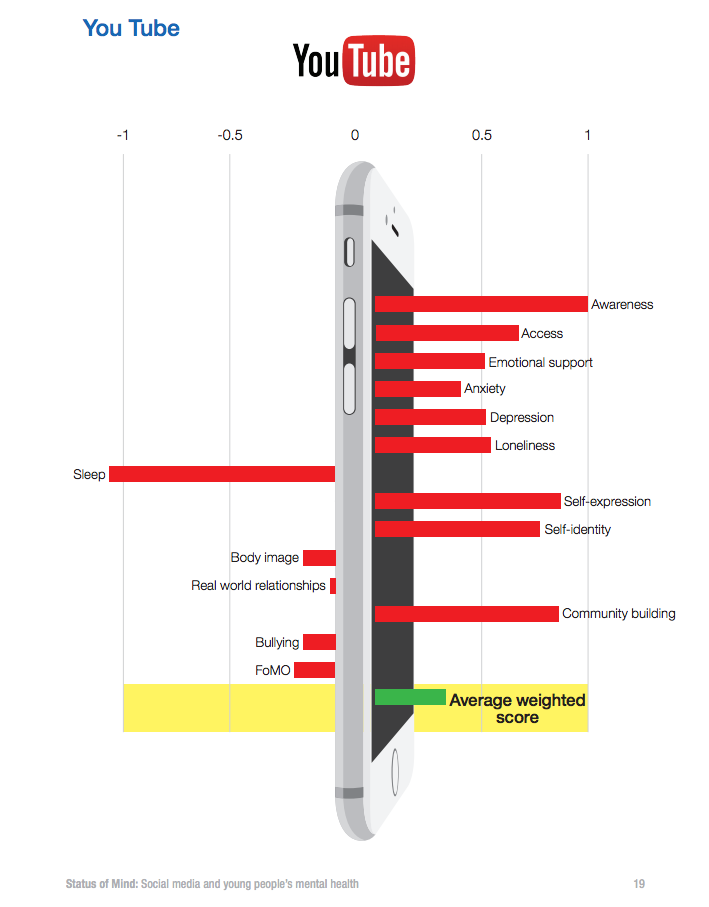Which is Worst for Your Mental Health: Instagram, Facebook or YouTube?

Social media is a relatively new experience for the human psyche. With social networks becoming more ingrained in people’s lives each year and each generation, it is vital that we understand the full impact each social network has on our mental health.
A new report, #StatusOfMind, published by the Royal Society for Public Health in the UK examined the effects of social media on young people’s mental health. After surveying almost 1,500 people between the ages of 14-24, their findings offered a clear picture of how different social media platforms impact mental health issues, including anxiety, depression, sleep deprivation, and body-image.
Instagram was found to have the most negative overall effect on young people’s mental health. The popular photo sharing app negatively impacts body image and sleep, increases bullying and “FOMO” (fear of missing out), and leads to greater feelings of anxiety, depression, and loneliness. The positive effects of Instagram include self-expression, self-identity, community building, and emotional support.

Facebook was found to have similar negative effects to Instagram in the categories of bullying, FOMO, body image, anxiety, depression, and loneliness. Facebook also has a particularly negative impact on sleep. However, Facebook had some strong positive effects as well, particularly in the categories of emotional support and community building.

The one social network that stood out from the rest as having an overall positive effect on mental health was YouTube. The video streaming platform scored very high in categories like awareness, self-expression, and community building. YouTube was also the only social network where anxiety, depression, and loneliness lessened with use. Many YouTubers actively try to create an online community where users can support one another. However, a major downside to YouTube was that it has the most negative effect on sleep.

Let’s break down the significance of some of the findings from #StatusOfMind…
Anxiety and Depression
Among young people, the rates of anxiety and depression have skyrocketed over the past 25 years, increasing by 70 percent. Researchers have reason to believe social media has played a part in this increase. Heavy social media users have been found to “report poor mental health, including psychological distress (symptoms of anxiety and depression).” Social media feeds feelings of inadequacy and anxiety. “Our own research has shown that young people themselves say four of the five most used social media platforms actually make their feelings of anxiety worse,” said the authors of #StatusOfMind. This level of anxiety can make it difficult for young people to leave the house, excel at their jobs, or concentrate on their studies.
According to the authors of the study, “Using social media for more than two hours per day has also been independently associated with poor self-rating of mental health, increased levels of psychological distress and suicidal ideation.” Researchers call this ‘Facebook depression.’ They believe this depression stems from the pressures of trying to keep up with “unrealistic expectations of reality’ and online peer pressure that “may be responsible for triggering depression or exacerbating existing conditions.” People tend to compare the mundane and painful aspects of their lives to the highlight reels their friends are posting online.
Body Image
While all social networks appear to have a negative impact on users’ body image, body image issues are especially prevalent on Instagram, which is used predominately by females and has a younger age demographic (90 percent of Instagram users are under 35). Photos uploaded to Instagram present an unrealistically perfect image, as countless photos are carefully selected and photoshopped to hide any flaws. According to the authors of #StatusOfMind, “As many as nine in 10 teenage girls say they are unhappy with their body.”
Whereas once people worried about the body-image expectations created by fashion magazines, Instagram now offers millions of new photos an hour for young girls to compare themselves to swimsuit models, wannabe swimsuit models, scantily clad yoga instructors, and celebrities (who have a team of make-up artists, hair stylists, personal trainers, and Photoshop gurus working behind the scenes). It’s no wonder that, as one study demonstrated, girls show an increased desire to change their appearance after spending time on Facebook. Even more troubling, social media appears to have caused a rise in cosmetic surgery amongst young people, who hope to look better in photos. One study showed a whopping 70 percent of 18-24 year olds in Britain would consider cosmetic surgery.
Sleep
Sleep is directly linked to mental health. “Sleep and mental health are tightly linked. Poor mental health can lead to poor sleep and poor sleep can lead to states of poor mental health,” explain the authors of #StatusOfMind. Social media use has a negative impact on both the amount of sleep people get and the quality of the sleep. It is especially harmful to browse social networks at night, because the LED lights in phones and computers interfere with the brain naturally releasing sleep hormones. Additionally, “One in five young people say they wake up during the night to check messages on social media, leading them to be three times more likely to feel constantly tired at school than their classmates who don’t use social media during the night.”
Social Media Can Offer Mental Health Support
One of the benefits of social media is that it can offer young people a place to turn for emotional support. According to #StatusOfMind, “Nearly seven in 10 teens report receiving support on social media during tough or challenging times.” Social networks can provide valuable mental health information and allow young people who may be suffering with mental health issues the opportunity to feel as though they aren’t alone.
Conclusion
Social media use has become inherently linked to mental health. This is especially true for young people, who tend to be heavy users and whose brains are actively developing socially and emotionally. After concluding their #StatusOfMind report, the RSPH is calling for the following:
- The introduction of a pop-up heavy usage warning on social media
- Social media platforms to highlight when photos of people have been digitally manipulated
- Social media platforms to provide reliable and consistent mental health information
- Safe social media use to be taught in school
The #StatusOfMind report, summed it up best: “Social media can and should be utilised as a tool for good – the challenge is to ensure social media companies are doing their utmost to make platforms a safe place to be, and for our young people to be equipped with the relevant skills to be able to navigate them and know where to seek help, should they need it.”
Tags: anxiety, parenting, self-awareness, self-esteem, self-understanding, sleep deprivation, social media, social network, social networking, stress, technology, teen, teen depression, teens









usually i’m very negative about theses types of report’s but your research is pretty reliable so good job i really enjoyed this
I love this article, but am unable to find when it was published, which is information I need in order to site it as a source. Does anyone know the date at which this was published? Thanks!
Thank you. It was published on Jul7 17, 2017.
do you have bibliography on it?
Thanks that really helped!
thx
Instagram was found to have the most negative effect on people’s mental health. Instagram has been associated with high levels of anxiety, depression, and bullying. No one is posting their failures. It is way too far from reality. People often think that only they do have flaws and they don’t enjoy like everyone else. It would lower the self-esteem of people. It should be used upto an extent where it doesn’t ruin your health and relationship.Thankyou for the sharing the information.
Thank you so much. This helped me a lot!
I believe she mostly used The Royal Society For Public Health and used their Status of Mind articles.
I think all social media (Facebook Instagram etc ) platforms affect mental health you well describe in your blog You method and research is amazing i really enjoy you blog
Thanks
I think YouTube also becomes toxic if you consume it regularly. I don’t use FB or IG so can’t say about that, but YouTube has some channels (at least in India) which promote depression and anxiety being cool in the name of supporting their victims. I was influenced by these channels at some point, and I actually started thinking that depression and anxiety are cool. I think YouTube should add a warning like it did in times of Covid that this particular video includes mental health advice provided by a non-professional. Thank you for this article.